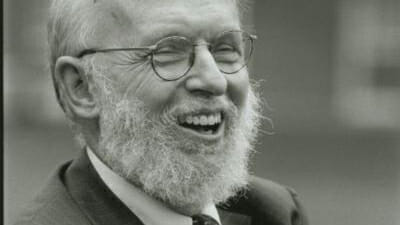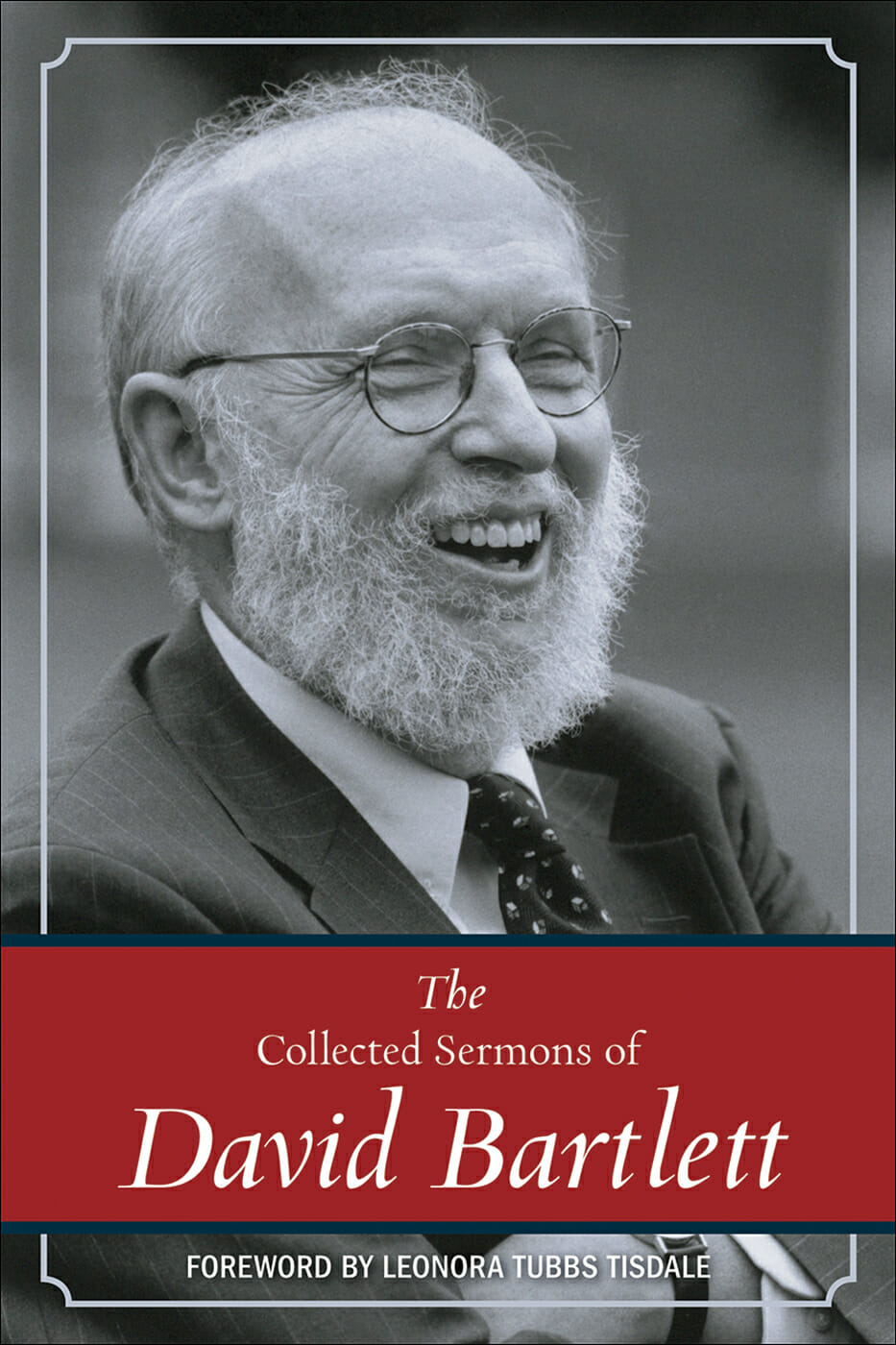
Welcome to the Choir
(1 Corinthians 14:6-19)
Rev. Dr. David Bartlett
March 13, 2020
David first worshiped at Marquand Chapel at Yale Divinity School in 1963 as a first year student in ministry. This sermon was preached on April 3, 2017, at the chapel for prospective and current students. This sermon was also the last sermon David preached before his death on October 12, 2017.
I.
What should I do then? “I will pray with the spirit, but I will pray with the mind also; I will sing praise with the spirit, but I will sing praise with the mind also.”
II.
Some time about the year fifty two of the Common Era, the apostle Paul got a letter from some of the Christians in the church he had founded at Corinth.
Among other things they reported on what it might feel like to be a stranger who wandered into the Corinthian church for a worship service.

The Collected Sermons of David Bartlett available now from Westminster John Knox Press. This collection of fifty-two sermons shows beloved New Testament scholar David Bartlett at his best. Bartlett, who died in 2017, spent his career teaching and mentoring preachers at The University of Chicago Divinity School, Yale Divinity School, Union Presbyterian Seminary, and Columbia Theological Seminary, as well as serving as a pastor in American Baptist churches. Thus, he has generations of friends and former students who knew him for his quick wit, passion for justice, and deep knowledge of the Bible.
The service was held in the house of the Stephanas family. Pillows and couches were strewn around the room and people tended to gather more or less in a circle sitting most immediately near worshippers who shared their liturgical enthusiasms.
At one side of the room were the so called prophets who specialized in Bible study. In one corner were the musicians playing their zithers and joining in or drowning out other forms of worship with praise songs. Sitting fairly prominently toward the center of the circle were the specialists in glossolalia—those who spoke in mysterious languages known only to themselves and the spirit and perhaps the angels. There was no order of worship because there was very little order in worship, but many Corinthians loved the gathering for its sheer enthusiasm and heartwarming spontaneity.
III.
In exactly the year one thousand nine hundred and sixty-three of the Common Era I came as a stranger, or at least as a brand new student, to worship for the first time in Marquand Chapel. The room looked just like a congregational meeting house, which of course was how it was supposed to look.
All the pews sat in orderly rows looking toward the chancel, whose skeletal remains you can see if you look that way. That odd wooden structure to the left of the chancel was an actual pulpit—high and lifted up.
All the congregants faced forward and spoke only when a leader invited us to speak. Mostly we sat and listened while the preacher—often a genuinely distinguished professor—reflected with great care and gentle fervor on a biblical text chosen for the day.
Then we sang a fairly sober nineteenth century hymn, exchanged polite greetings and headed for coffee hour where we managed at last to enjoy whatever modicum of enthusiasm and spontaneity the day allowed.
IV.
In the complicated dialectic of Christian life you could say that the Corinthians sang with the spirit and needed to be reminded to sing with the mind also, while at YDS we sang with the mind but did not sufficiently attend to the spirit.
As student and teacher, I have spent much of my adult life at this school and I bear testimony that I think this place has come a long way toward delighting in the tension Paul prescribed: those of us who love the life of the mind are often reminded quite simply to rejoice, and those of us who love all kinds of melody are reminded that sometimes the words we speak and sing mean something, too.
Those of us who love the life of the mind are often reminded quite simply to rejoice, and those of us who love all kinds of melody are reminded that sometimes the words we speak and sing mean something, too.
A very quick history of what has helped. Not that long after my years as a student, Yale Divinity School married Berkeley Divinity School and astonishingly all of us who had participated in the Lord’s Supper discovered the possibilities of something called Eucharist. At one level this was a lovely broadening of our ecumenical vision; at a deeper level now when we Free Church people gathered at the table our somber remembering was sometimes astonishingly turned to joy.
And then came the Institute of Sacred Music. A great change for a school that had been notable mostly as an institute of sacred thought with a nod to the occasional solemn song. Now more and more, spirit and mind came together and the human creativity of music, visual art, poetry and fiction joined in praise of the creator.
V.
So here is what I still believe are the gifts that God has given this school, for those of you who are visiting and for those of you have already chosen to give some portion of your life to this place.
Here, to quote Saint Anselm, or as we Baptists say, “Anselm”, here faith seeks understanding. However deep, joyful, life changing and world renewing our trust in God, here we obey Paul’s injunction. We are not content to sing with the spirit only, we sing with the mind also. We are not content only to have faith; we think about it.
In my years here as a student I took a course on Paul Tillich, taught by Professor George Lindbeck. Lindbeck was at that time a Protestant observer at Vatican II, and he would fly in from Rome having read Tillich’s latest volume on the plane. We talked in class about the way in which wise people like Paul Tillich and the Vatican theologians were helping us speak faith in a new and newly secularized world.
In those same years one of my fellow students accused one of Lindbeck’s colleagues: “Professor, the issues are so visceral and you are so cerebral.” But what we learned as students in those years is that one can be viscerally cerebral. The intellectual love of God; I will pray with the spirit, but I will pray with the mind also.
VII.
But it is equally true that at Yale Divinity School understanding is invited to seek faith. It is not a requirement of studying religion that one not be committed to religious practice.
Early in my career I taught at the Divinity School of the University of Chicago. One of the most accomplished PhD students who was also a Jesuit said to me one day, “You know at Chicago they always ask what tradition you’re from. I want to tell them what tradition I’m in.”
Here you’re welcome to tell us what tradition you’re from, what tradition you’re in or what tradition you’re longing for.
Here it as actually all right to stop by at the chapel on the way to the library, to celebrate Eucharist aka Lord’s supper with the community from Berkeley, to attend a concert not only because you love the music but because you are curious, enticed or even convinced by the words.
Long after George Lindbeck taught us about Tillich and Vatican II and the attempts of really smart people to make faith understandable he wrote his own book called “The Nature of Doctrine” where he suggests that if you’re actually seeking faith maybe your best bet is not just to think about it, but to watch it at work.
If you’re curious about worship, attend a worship service. If the hymn puzzles you, sing it. Don’t just walk past the chapel at 10:30, drop in.
If Paul had it right what you find when you worship here will be articulate but not only articulate—maybe also helpful, maybe grace-full, maybe lovely.
VII.
At any rate, dear visitors or citizens, wanderers of course but also maybe pilgrims, here is what I cherish about this school after fifty-four years.
On our good days we sing with the spirit but we sing with the mind also. On our good days faith seeks understanding and understanding at least keeps an eye out for faith.
On our good days we sing with the spirit but we sing with the mind also. On our good days faith seeks understanding and understanding at least keeps an eye out for faith.
When George Lindbeck, who turns out to be the protagonist of this homily, when George Lindbeck retired we had a party for him in the common room and asked him to say a few words.
It was Christmastime and Professor Lindbeck had just gotten out of Yale New Haven Hospital where he had been recovering from surgery. His remarks in the common room ended something like this:
“Last week I was listening to NPR and heard the annual Christmas concert of the Saint Olaf College Choir. After the concert the radio host asked one of the Saint Olaf students why she enjoyed singing in the choir. She said: ‘Because when I sing in this choir I join in song that began long before I came here and that will continue long after I am gone.’”
“When I do theology,” said George, “I join in song that began long before I came here and that will continue long after I am gone.”
Welcome to the choir.
David L. Bartlett was the J. Edward and Ruth Cox Lantz Professor Emeritus of Christian Communication at Yale Divinity School and Distinguished Professor Emeritus of New Testament at Columbia Theological Seminary. He spent his career teaching and mentoring preachers at The University of Chicago Divinity School, Yale Divinity School, Union Presbyterian Seminary, and Columbia Theological Seminary, as well as serving as a pastor in American Baptist churches in Minnesota, Illinois, and California. Excerpted from The Collected Sermons of David Bartlett © 2020 Estate of David L. Bartlett. Used by permission of Westminster John Knox Press.
The views expressed are those of the author and not necessarily those of American Baptist Home Mission Societies.


